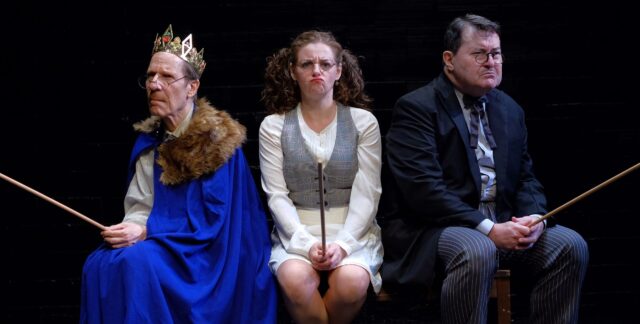
Steve Sterner, Yelena Shmulenson, and Allen Lewis Rickman share the joys of Yiddish in The Essence (photo by Jonathan Melvin Smith)
THE ESSENCE: A YIDDISH THEATRE DIM SUM
Theatre 154
154 Christopher St. between Greenwich & Washington Sts.
January 7-12, $52.37
www.everyonesyiddish.com
www.congressforjewishculture.org
If you believe that everything sounds better in Yiddish — as I do — then The Essence: A Yiddish Theatre Dim Sum is for you.
For more than ten years, this eighty-five-minute presentation has been staged in the northeast and Europe, offering a vaudeville-influenced history of Yiddish theater through comedy sketches, songs, and informational background inspired by Nahma Sandrow’s 1977 book, Vagabond Stars. The play’s subtitle works in multiple ways: dim sum means “touch the heart” in Chinese, and Yiddish certainly touches the heart (as well as the soul and the gut); dim sum is a meal made up of small dishes, like skits; and there is a long connection between Jews and Chinese food.
But most of all, it’s a celebration of a language that goes back a thousand years and has supposedly been on its deathbed time and time again but still keeps going. As Leo Rosten wrote in his introduction to his classic 1968 dictionary, The Joys of Yiddish, this book “illustrates how beautifully a language reflects the variety and vitality of life itself; and how the special culture of the Jews, their distinctive style of thought, their subtleties of feeling, are reflected in Yiddish; and how this in turn has enhanced and enriched the English we use today.”
Originally presented by the New Yiddish Rep and now by the Congress for Jewish Culture (CJC), The Essence, the follow-up to CJC’s Bashevis’s Demons at Theater 154, is a tasty chronological performance lecture starring actor, pianist, silent film accompanist, and cruciverbalist Steve Sterner, a native New Yorker who also serves as musical director; actor, audiobook narrator, and pianist Yelena Shmulenson, who was born in Belarus and raised in Ukraine; and Queens native Allen Lewis Rickman, who also wrote and directed the show. All three have worked with the National Yiddish Theatre Folksbiene, which has dazzled audiences with Yiddish productions of The Golden Bride, The Sorceress, Fiddler on the Roof, and more. Rickman (Relatively speaking, The Big Bupkis! A Complete Gentile’s Guide to Yiddish Vaudeville) and Shmulenson (The Megillah for Itzik Manger, The Golem of Havana) previously teamed up in the CJC’s The Dybbuk and Tevye Served Raw and portrayed the nineteenth-century shtetl couple in the prologue of the Coen brothers’ film A Serious Man.
They take the audience on a rollicking journey through such Yiddish songs as “A Shtetele,” “Nit Bashert,” and “Dona, Dona” and scenes from such early Yiddish shows as Di Kishufmakherin, Moshiakh in Amerike, and Dem Shuster’s Tokhter. Some bits work better than others, but there’s plenty here to make you smile, laugh, and nod in agreement. “Yiddish is an amazing language for expressing emotion, and it’s an incredible language for humor,” Shmulenson says.
Yelena: You see, in Yiddish you can’t just say something, you have to make it interesting. You can’t say —
Steve: “To be or not to be . . . that is the question.”
Yelena: You have to say “Zayn oder nit zayn . . . du ligt der hint bagrubn.”
Steve: “To be or not to be . . . that’s where the dog is buried.”
They gleefully discuss how colorful Yiddish curses are and list the many Yiddish words for son, unfortunately, and imbecile. “When the going gets tough, the Yiddish start cursing,” Rickman explains. “It’s opera, it’s poetry . . . Yiddish cursing is sculpture made from hate.”
The cast tells stories about Avrom Goldfadn, the failed newspaper publisher, failed medical student, failed teacher, failed ladies’ hat shop manager, and successful poet who was the Father of Yiddish Theater; describe how amateur groups put on Yiddish plays in concentration camps during WWII; delve into the German Jews known as the Yekes, who wanted to assimilate in America and actively campaigned against Yiddish theater coming here; and how John Barrymore, Paul Robeson, Orson Welles, Al Capone, Cole Porter, and kings and queens were enthralled with Yiddish theater. “In Paris even antisemites went to Yiddish theater,” Sterner points out. Rickman adds, “None of those people understood Yiddish, but they all went, anyhow.”
You don’t have to know any Yiddish to find the joy in The Essence, as English supertitles are projected on a small, framed horizontal screen above a red curtain, behind which the actors change costumes as they move from shtick to shtick, proving that, as Rickman writes in the program, “Yiddish theater is not any one thing, and it never was. It was naturalistic, expressionistic, melodramatic, and intimate. It was — and is — bombast and nuance, singing and silence, art and trash. It’s been around for a century and a half, and it’s been absolutely everything. The only thing that ties it together is its history of innovation, and, of course, the language.”
And as Rosten writes, “What other language is fraught with such exuberant fraughtage?”
Hobn a groys moltsayt!
[Mark Rifkin is a Brooklyn-born, Manhattan-based writer and editor; you can follow him on Substack here.]